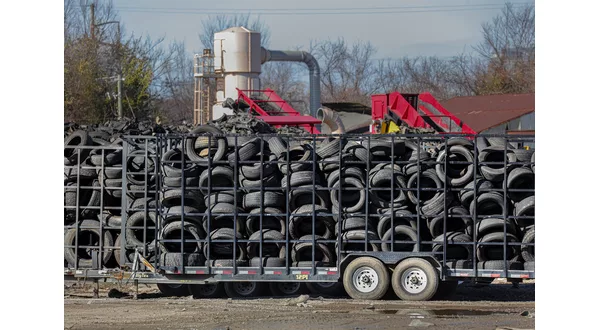
Photo: Loads of tires sit on trailers at the Davis Rubber Company facility in east Little Rock in December 2022. (John Sykes/Arkansas Advocate)
A group of tire shops across Arkansas can expect letters from state tax officials to greet them at the start of the new year.
According to Arkansas Advocate, thanks to a new state law, the Department of Finance and Administration now has the authority to close a business that becomes delinquent on waste tire fees.
The new power is meant to help fix Arkansas’ underfunded tire recycling program, but local recycling officials across the state are skeptical it’s a long-term solution.
In all, 346 businesses owe $4.3 million in unpaid scrap tire fees, but the state doesn’t expect to recoup nearly that much.
More than $2.6 million of the debt belongs to 185 now-defunct businesses, and collection from those businesses is rare, according to Scott Hardin, a finance department spokesman.
The new law took effect Oct. 1, and any business delinquent by two months or more will receive a letter.
The department declined to release a list of the delinquent business, citing tax privacy laws.
“The earliest an account will qualify for Business Closure will be after the first of the year for the October, November, and December periods,” Hardin said in an email. “The first Business Closure Warning letters will be distributed in January to delinquent accounts. The process will be complete (closure will take place) at the end of February to early March if the accounts remain unpaid.”
The disposal of scrap tires presents a difficult problem, and so far, Arkansas hasn’t found a sustainable solution.
Tire dumps attract a host of environmental problems, namely mosquitoes and rodents, and burning tires produces thick, toxic smoke.
They shouldn’t be piled into landfills because they take hundreds of years to decompose, but there also isn’t a huge market for recycled products from old tires.
The recycling process isn’t cheap, in part, because tires are lined with steel. So for most applications, that steel has to be separated from the rubber. But there are some promising new uses for tire-derived fuel, including in Northeast Arkansas’ steel mills, possibly creating a long-term market for recycled tires with minimal processing.
The complex problem has forced state policymakers to revamp the Arkansas waste tire program several times over the last few decades, including earlier this year.
This year’s legislation consolidated the state’s 11 tire districts into four districts and gave business closure authority to DFA.
The four new districts have formed and submitted plans to the Arkansas Department of Energy and Environment.
The plans must be approved by the department, the Pollution Control and Ecology Commission and the Arkansas Legislative Council. A department spokeswoman said there is no timeline for approval.
The decision on whether to approve those plans will dictate the next steps for the program.
Each of the four districts submitted proposals to be reimbursed $2.80 per tire or more. The program’s current funding structure, though, can only support reimbursing districts at about $2.57 per tire, according to multiple tire district directors.
Even if the state can collect some of the delinquent tire fees, “it’s simple arithmetic,” said Craig Douglass, executive director of the Regional Recycling and Waste Reduction District in Pulaski County.
The state’s current scrap tire program was created in 2017 and is funded by a $3 “rim removal fee” paid by tire customers. (It’s only $1 if the tire is being replaced by a used tire.)
Retailers remit those fee collections to the state, and in exchange, may dispose of scrap tires at licensed facilities. (Individuals may dispose of up to four tires a month at state-permitted facilities free of charge.)
The current rim removal fee generates only enough revenue to reimburse districts for up to $2.57 a tire. Those revenues already fell short during the 2nd quarter last year, unable to cover the costs of the program.
When the program ran out of money in August, some tire recycling facilities stopped accepting scrap tires, leaving piles of old tires to collect at car dealerships and tire shops.
The program has remained funded ever since, thanks to $1 million in stop-gap funding allocated by state lawmakers in late 2022.
Asked about the sustainability of the current program, the Energy and Environment Department spokeswoman said: “We do not have any additional information at this time.”
Lawmakers, with support of local tire recyclers, proposed a solution in April. That bill would have levied the $3 tire fee on the purchase of new tires — including on new vehicles — and charged more for large tires to raise more money to fund the program.
But Gov. Sarah Huckabee Sanders’ administration balked at the proposal over the fee increases, which the Department of Finance and Administration estimated would’ve raised an additional $2.3 million to $5 million annually.
If the new district plans are approved, the Legislature will likely again be asked to allocate more money to cover the costs of the program that exceed the rim-removal fee collections.
In that case, policymakers may find themselves in the same place they have every few years for decades: again searching for a sustainable solution to dispose of old tires.
WebReadyTM Powered by WireReady® NSI










